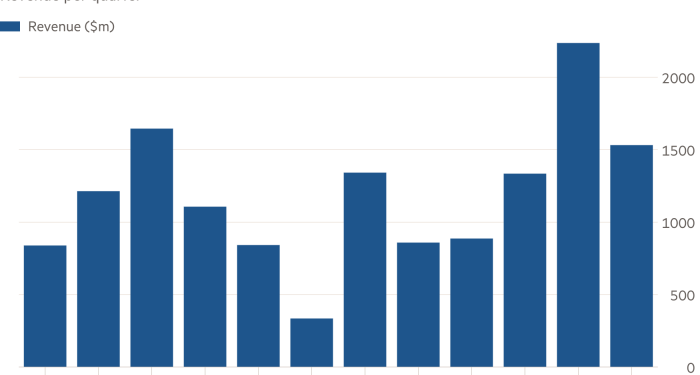The company formerly known as Facebook renamed its staff “metamates” yesterday, as in shipmates sailing the good ship Social Media into the metaverse.
“Now is the right time to update our values and our cultural operating system . . . as we start working on this next chapter for our company,” said chief executive Mark Zuckerberg.
Others are heading with a wet sail for the metaverse in different ways. On Tuesday, JPMorgan said it was the first lender in the metaverse as it opened its Onyx lounge in the Decentraland virtual world. It also issued a white paper on how companies should be approaching the new medium, with the market opportunity for bringing the metaverse to life likely to be worth more than $1tn in annual revenues.
Ad group Havas said today it now owns a plot of land in The Sandbox virtual world where it planned to inaugurate its first virtual Village. “Using rich programming, exclusive content, connected animation and gamification, the Group will organise conferences, events, concerts, product launches and more,” it said, as part of its move to win business with brands developing their communications strategies for the metaverse.
Elsewhere, Walt Disney has appointed an executive to lead its voyage into the metaverse. Mike White becomes senior vice-president in charge of next generation storytelling.
In China, the approach is different again — they form a committee. Eleanor Olcott reports local governments and state-backed entities are pumping money in, with the new Metaverse Industry Committee announcing on Wednesday that 17 companies had been included in the organisation to “promote the healthy, orderly and sustainable development of the metaverse”.
That might surprise some observers given the concept’s association with the gaming and cryptocurrency industries — both of which Beijing has either curtailed or banned to curb gaming addiction and capital flight.
But China appears to have recognised the metaverse will be much bigger than those sectors. It’s not Second Life, rather the virtual land ahoy! of a third form of the web, and everyone is setting course for this new world.
The Internet of (Five) Things
1. Google to limit user tracking
Google has announced new measures that will limit tracking across its Android operating system, following a similar move by Apple to introduce restraints in the way the online advertising industry can target users. The company said it planned to eventually phase out advertising IDs, a code that allows marketers to track individual user behaviour.
2. California and UK step up social media pressure
California lawmakers plan to introduce a new bill to protect children’s data online this Thursday, mirroring the UK’s recently introduced children’s code. In the UK, the Home Office is pushing for sweeping new powers that would require internet companies to monitor for “legal but harmful” user content. Meanwhile, Chinese online video streaming service Bilibili plans to hire 1,000 content censors after the recent death of a 25-year-old staffer sparked heated debate about overwork in the industry.
3. Airbnb expects to attract more hosts
With listings barely growing, Airbnb chief Brian Chesky thinks rising inflation may drive more families to become hosts. Lex says that after losing money in 2020, Airbnb is posting quarterly profits — albeit small ones, such as $55mn in the fourth quarter.
4. Schmidt creates philanthropic AI fund
Former Google chief executive Eric Schmidt is launching a $125mn philanthropic project to fund artificial intelligence research that solves “hard problems” in the field, including issues of bias, harm and misuse, geopolitical conflict and scientific limitations of the technology. The fund, known as AI2050, will be paid out over five years to individual academics.
5. Ericsson may have paid Isis
Shares in Ericsson fell sharply after Borje Ekholm, chief executive of the Swedish telecoms equipment maker, conceded it could have made payments to terror organisation Isis in Iraq. An internal investigation found serious breaches of compliance rules in Iraq, including payments for transport routes to evade local customs. Lex says investors see a potentially massive moral failure that could prompt steep fines or settlements.
Tech tools — Google’s smarter canvas

Google has just upgraded its smart canvas collaboration tools in its Workspace productivity suite. New features include automatically generated summaries in Docs that provide a brief overview of the main points in a document, a pageless format that lets you remove the boundaries of a page to expand your text to the device or screen you’re using, plus a “Maps smart chip” that allows you to preview a Google Maps link directly in Docs. All of these are being rolled out this week.











